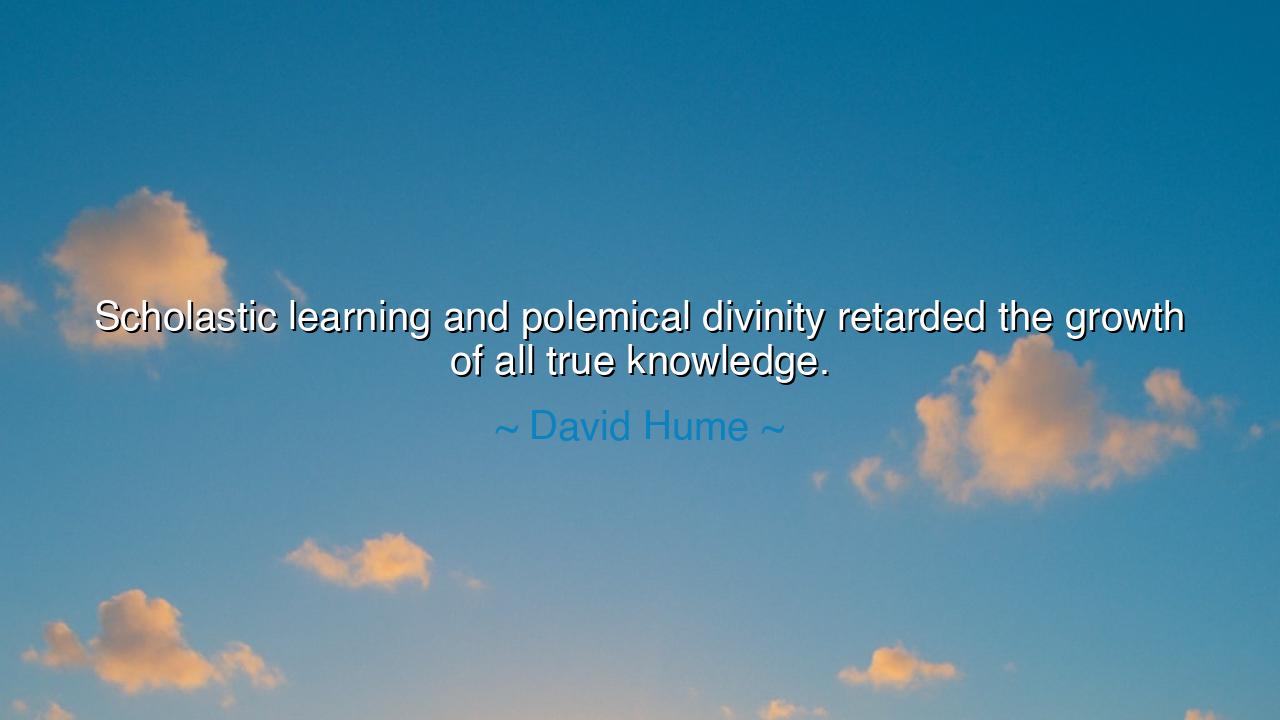
Scholastic learning and polemical divinity retarded the growth of






“Scholastic learning and polemical divinity retarded the growth of all true knowledge.” — David Hume
In these fierce and luminous words, David Hume, the philosopher of reason and empiricism, speaks as one who saw clearly the chains that bound the mind of man for centuries. His sentence is a cry of liberation — a declaration that true knowledge can only flourish where thought is free, where inquiry dares to question the sacred and the assumed. By scholastic learning, Hume referred to that rigid, lifeless system of medieval thought which sought truth not through observation, but through repetition — through logic twisted into obedience to dogma. And by polemical divinity, he meant the endless quarrels of theologians, their minds entangled in disputes over the unknowable, their zeal turning light into smoke. Together, he saw these forces as the great frost of the human intellect — freezing curiosity, and stunting the tree of wisdom before it could blossom.
To understand the origin of this declaration, one must look to the long night before the dawn of the Age of Enlightenment. For centuries, the universities of Europe were ruled by scholasticism, a discipline born in the shadow of authority. Men studied Aristotle not to discover truth anew, but to defend what had already been decreed. Thought was confined within the walls of theology; reason was a servant, not a sovereign. Questions that should have set the mind aflame — about the stars, the body, the earth — were forbidden, for they challenged the hierarchies of both heaven and church. It was not ignorance that chained humanity then, but the arrogance of certainty. And so Hume, writing in the eighteenth century, looked back upon those ages and saw how centuries of worshipping theory over evidence had retarded the growth of all true knowledge.
But the human spirit cannot be forever imprisoned. Out of that long darkness arose men who refused to think by permission — Galileo, who looked through his telescope and saw not dogma but the truth of motion; Francis Bacon, who declared that experiment and observation must replace blind tradition; Descartes, who dared to begin all thought with doubt. Each of these stood against the mighty edifice of scholastic learning and polemical divinity, and in doing so, broke its hold. Galileo was condemned by the Church; Bacon was ridiculed by scholars; yet through their defiance, knowledge awoke from its long sleep. The torch that Hume would later bear — the torch of empiricism — was lit by their courage.
Hume’s words, however, do not call us to despise religion or philosophy, but to discipline them by reason. For faith and thought, when pure, are not enemies, but companions. Yet when faith turns to polemical divinity, seeking not truth but victory in argument, it becomes a poison. When philosophy forgets the world it seeks to explain, becoming only a tangle of abstractions, it ceases to enlighten and begins to obscure. The true philosopher, said Hume, must look not to the heavens for decree, but to experience, to evidence, to the living world itself. For it is through contact with reality — through what we see, test, and feel — that the mind grows strong and clear.
This struggle between dogma and discovery has echoed through all ages. Consider the story of Giordano Bruno, who dared to say that the universe was infinite and that countless worlds spun through the void. For this vision — so bold, so vast — he was burned alive in Rome. Yet centuries later, his words were vindicated. The stars he imagined were found to be suns indeed, each with their own possible worlds. His death stands as a monument to Hume’s warning: that whenever learning becomes a tool of pride or power, the growth of true knowledge is not merely slowed, but strangled.
Hume’s voice is a reminder that the pursuit of truth requires freedom — freedom to question, to doubt, to explore. A mind that fears punishment cannot be a mind that discovers. To learn truly, one must walk beyond the walls of accepted thought, to risk being wrong in the search for what is right. The scholastic mind seeks safety in tradition; the enlightened mind seeks courage in discovery. And this courage, once found, becomes the seed of all progress — in science, in art, in every act of creation.
Therefore, dear seeker, let Hume’s words burn within you as both warning and invitation. Beware of any system — religious, academic, or political — that demands belief without question. Do not mistake the noise of debate for the voice of truth, nor the complexity of argument for the clarity of understanding. Cultivate humility before evidence, and let experience be your teacher. Read, test, think, and observe for yourself, for only through such freedom can true knowledge grow.
And when you encounter the silence of conformity — when others accept without seeing, or believe without understanding — remember Hume’s wisdom. Break the silence with inquiry. Free the mind from the chains of empty learning. Seek not to defend what has always been taught, but to discover what has not yet been known. For every age that has dared to do this — every age that has chosen truth over dogma — has moved the world forward into light. And the flame that guides it still is the same that burned in Hume’s heart: the unyielding belief that reason, once liberated, is the highest expression of the human soul.






AAdministratorAdministrator
Welcome, honored guests. Please leave a comment, we will respond soon